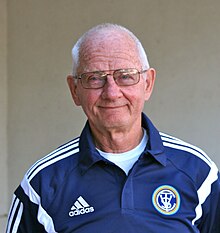Lothar Osiander
This poorly sourced must be removed immediately from the article and its talk page, especially if potentially libelous. )Find sources: "Lothar Osiander" – news · newspapers · books · scholar · JSTOR (March 2016) |
 Osiander in 2015 | |||
| Personal information | |||
|---|---|---|---|
| Date of birth | November 8, 1939 | ||
| Place of birth | Munich, Germany | ||
| Position(s) | Midfielder | ||
| Youth career | |||
| Years | Team | ||
| 1964–1965 | City College of San Francisco | ||
| 1966–1967 | University of San Francisco | ||
| Managerial career | |||
| California Surf (assistant) | |||
| –1985 | San Francisco Greek-Americans | ||
| 1986–1988 | United States | ||
| 1988–1992 |
United States U23 | ||
| –1991 | San Francisco Bay Blackhawks (assistant) | ||
| 1992 | Palo Alto Firebirds | ||
| 1995 |
Atlanta Ruckus | ||
| 1996–1997 |
Los Angeles Galaxy | ||
| 1998–1999 | Tampa Bay Mutiny (assistant) | ||
| 1999 | Project 40 | ||
| 1999–2000 | San Jose Earthquakes | ||
| –2007 | San Francisco Greek-Americans | ||
Lothar Osiander (born November 8, 1939) is a German
Biography
Osiander moved to the United States with his family in 1958, settling in the San Francisco area. He attended
Osiander was an assistant coach with the
Osiander eventually returned to San Francisco, becoming a waiter at Graziano's, a local restaurant, while playing and coaching in the city's highly competitive soccer leagues. In 1985, he coached a semi-pro club, the
By that time, Osiander was well known on the national coaching scene. Back in 1974, the United States Soccer Federation (USSF) had hired Osiander as part of its coaching staff. At the time Walter Chyzowych was the U.S. head coach and in that capacity would travel the country putting on coaching clinics. Osiander traveled as part of Chyzowich's team and became known as an excellent teacher and coach. In 1978, the U.S. Olympic committee inaugurated a National Sports Festival, hiring Osiander as the West team soccer coach. He continued in this position for the next ten years.
By 1986, Osiander's success with the Olympic Festivals and the Greek Americans led Chyzowich, now head of USSF, to hire Osiander to replace fired
While he left the senior national team in 1989, Osiander continued to coach the U.S. B Team and eventually the
When not coaching, Osiander had continued to work at Graziano's, rising from waiter to
As he no longer had a job either with Graziano's or the national team and since semi-pro or assistant coaches rarely earn much, Osiander was forced into full-time professional coaching. In 1995, the expansion
Osiander's success with the Greek-Americans and Ruckus brought him to the attention of the newly created
In January 1998, the
Since leaving MLS, he returned to his position as coach of the San Francisco Greek-Americans. He also coaches local Bay area youth teams, including the U-17 Ballistic Boys which won the 2003 State Cup as an U-16 team. Finally, he is the head coach of San Ramon United, an U-17 team.
The
References
- ^ "SPORTS PEOPLE – SOCCER – New National Coach – NYTimes.com". The New York Times. January 17, 1989. Retrieved March 13, 2016.
- ^ "OLYMPICS – U.S. Soccer Player Gives Attitude a Big Assist for His Scoring Touch – NYTimes.com". July 21, 1992. Retrieved March 13, 2016.
- ^ https://web.archive.org/web/20040101162540/http://www.socceramerica.com/article.asp?Art_ID=1128. Archived from the original on January 1, 2004. Retrieved March 31, 2007.
{{cite web}}: Missing or empty|title=(help) - ^ "Galaxy Replaces Coach". The New York Times. June 11, 1997. Retrieved March 13, 2016.
- ^ "Archive - southcoasttoday.com - New Bedford, MA". southcoasttoday.com. Retrieved March 13, 2016.
- ^ "United Soccer Leagues, Part 3 (1997-1999)". Retrieved March 13, 2016.
- ^ "PLUS - SOCCER - The Earthquakes Dismiss Osiander - NYTimes.com". The New York Times. January 13, 2001. Retrieved March 13, 2016.
